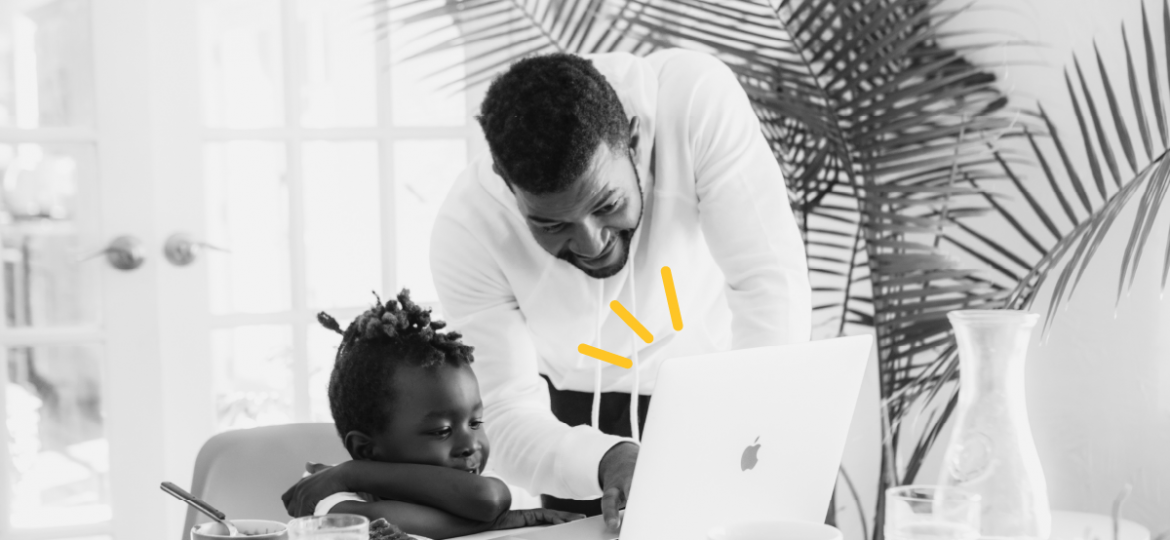
As more people in the US are vaccinated (as of writing this nearly 30% of US residents are fully vaccinated, and nearly 43% of US residents have received at least one dose), we are all faced with the next phase of what life will look like…what work will look like.
And yet, there is still the same feeling of uncertainty or tentativeness – it is just coming from a different place than it was before.
A year ago, we were preoccupied with thoughts of keeping ourselves safe from the unknown. We were asking ourselves “Do we need to wipe down our groceries?” and “Do we need to avoid family and friends totally?”
Today, those questions have shifted to “I’m vaccinated, so what does that mean?” We are now trying to work through finding our personal risk tolerance and trying to figure out what a re-entry into a physical workspace could look like and determining what are safe ways we can start to visit with our loved one.
As we move into the next chapter, I want to make sure we honor and recognize that it will come with a whole new set of questions as well as things we may be excited, anxious, or unsure about.
There have been multiple studies and articles written that elaborate on the way people are wrestling with these new fears and anxieties. The National Center for Health Statistics recently released a study showing nearly 1/3 of Americans experienced or were showing signs of clinical anxiety or depression during the height of the pandemic.
Knowing these, we can safely assert that people are feeling anxiety and depression about these new sets of changes we are now facing.
Last time, I asked you a series of questions about things you would like to Hold Onto and Do Differently, as well as the things you have Been Feeling and are Excited About moving forward. Here is how you answered:
What words would you describe this past year?
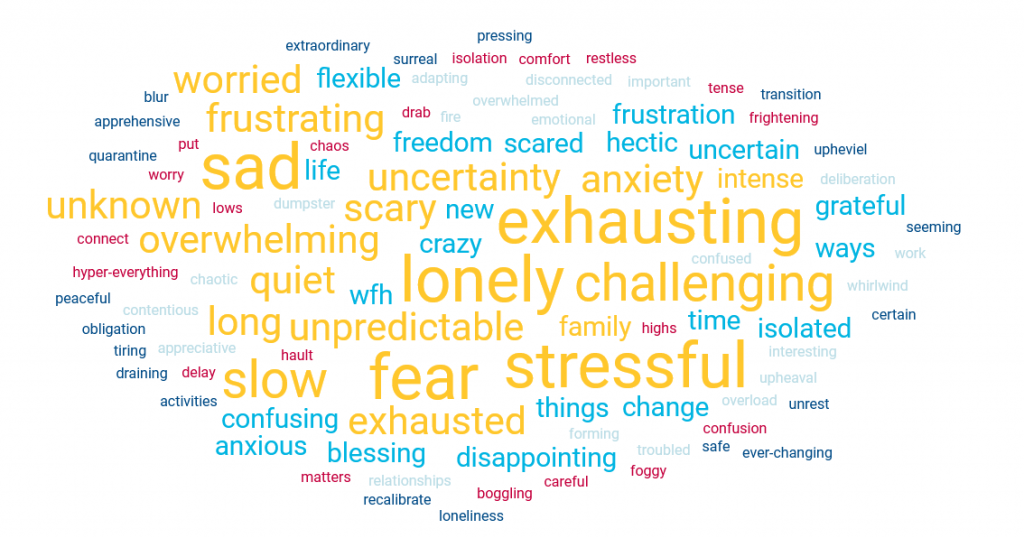
Themes of exhaustion, frustration, loneliness, and stress came up repeatedly looking back on our time spent in quarantine.
What are you most excited about as you navigate the re-entry into our next chapter?
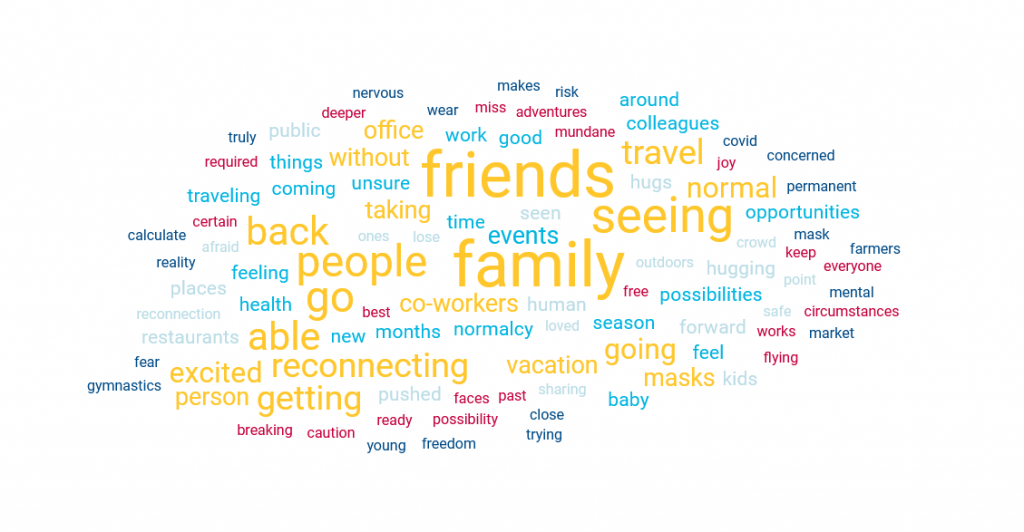
As we look towards re-entry, the biggest theme was around reconnecting with our loved ones.
“The health and safety of our family through vaccinations and masks. Having my family see my parents for the first time in over 18 months!”
“Continued growth in learning who I am and how I can support those around me. I have hope for our communities to be respectful and flexible as we navigate the next chapter.”
“I am very excited to not be scared to go in public again. I can’t wait to go to restaurants and sit inside. I am so excited to be able to see friends, travel and go to events like normal.”
What do you want to or wish you could hold onto from this last year?
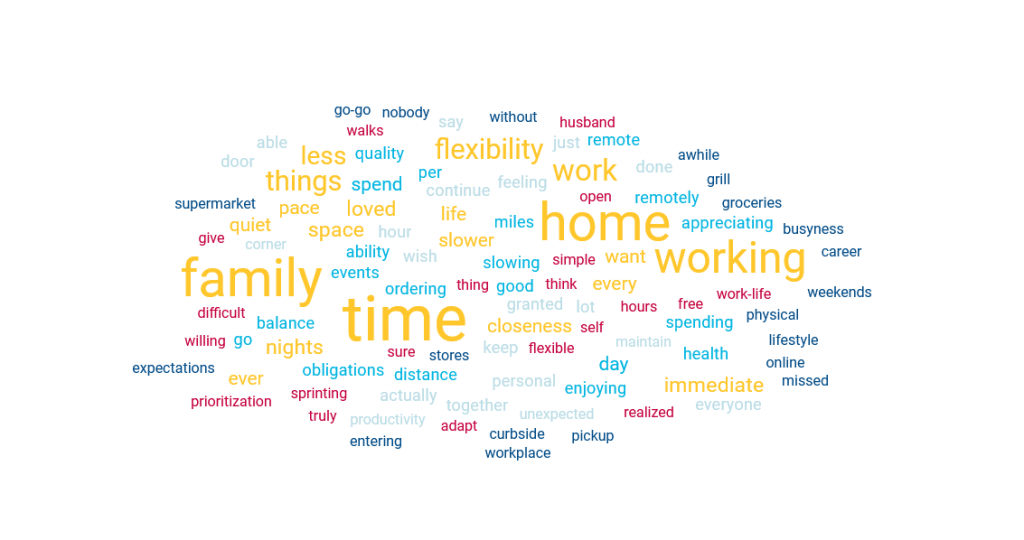
When we talk about the things we want to hold tightly onto, themes of family kept popping up.
But I also want to draw attention to the seemingly small things peppered throughout: weekends, flexibility, working from home, less obligations, curbside pickup, slowing down, quality time, walks…
“Working remotely, more flexible hours, enjoying simple things like walks, more open free time, less sprinting through all of life.”
“Work-life balance. I don’t think I ever truly realized before how I DID NOT have it, and that will be a very difficult thing to give up, and I’m not sure I’m willing to.”
“The simplicity of doing less and having less be okay. Covid allowed me to say no to things that I normally would have felt obligated to do and I loved working from home!”
“Working from home gave me the time and space to grieve the loss of my mom, and through that grief, I got in touch with my love of writing. I don’t want to lose that time and space to write.”
“Cherish watching your children learn and grow right under your nose. Don’t ever take time with them for granted. Long phone calls with my best friend who live across town.”
These small lifestyle changes are the things we hear repeated. They are the things that we have gained and valued enough to wish to hold them close as we move forward. They are the things I want leaders to hear most as they look at ways to create workplaces for humans in this next chapter.
What is something you want to do differently knowing what you know now?
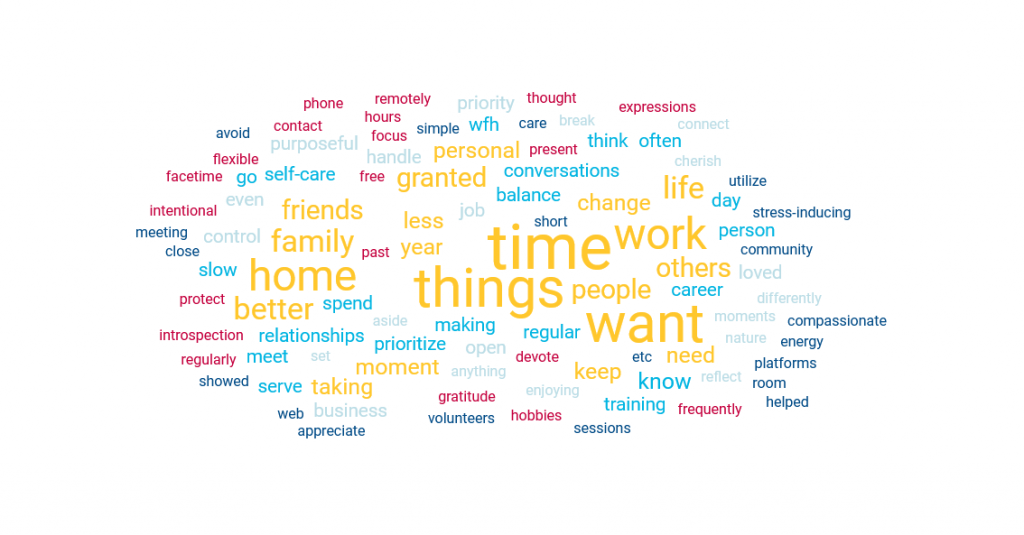
Bottom line: People want to hold onto the time they got back.
“Protect my free time, focus my work time (in the flexible hours I can now work remotely), be more intentional with which relationships and hobbies I devote myself to.”
“Work from home more often/regularly, if not all of the time. I never in my life thought I would want to WFH, but this past year showed me that not only can I do it, I do it well and so many other things at home are less stress-inducing because of that.”
“Making time for family and friends, not waiting for that “when this happens, I’ll do that” moment to do what I want to do.”
“Be more purposeful with my time/prioritize better Keep “even playing field” mentality at work – what changes does this produce for our team/organization.”
“Not taking so many things for granted, living in the moment more, take the time now to cross things off bucket list because we do not know how much time we have on this earth.”
Of all the responses we received, this one encapsulated so much about what people are going through right now and I invite you to sit with this sentiment for just a moment.
“It’s all just so much. I’m experiencing a level of tired right now that I didn’t know existed. I am tired in every sense of the word.”
Moving Forward Together
There is an extraordinarily powerful desire by some to ‘get back to normal right away.’
What I want you to understand is we as individuals and as a community, a global community, is we are all permanently changed by the collective trauma of this pandemic. We will all look different coming out of this than we did going into it – and everyone’s differences will be unique to their lived experiences over the last 16 months.
I also want to take a moment and challenge this idea of ‘getting back to normal.’ I would argue that ‘normal’ wasn’t better, it was simply familiar and comfortable.
Was a 2-hour commute better than the slow mornings we gained?
Was working 60, 70, even 80 hours a week better than the remote 40-hour weeks some have achieved?
Was the ‘butts in seats’ mentality better than the evolution to full-time remote environment?
We need to challenge the idea of getting back to normal at every opportunity. Our generation has been gifted this opportunity to fundamentally question what is important to us, to explore and demand we do things differently, and to courageously ask and release the things we no longer want in our lives.
My Next Chapter
I want to share with you my own experience and give context around the things I will be doing differently.
Pre-pandemic, my life was my work. I would fill my time with phone calls, with meetings, with work (and this is work I am passionate about). I would travel many times a month, sometimes multiple times a week and would then use my weekend free time to sit down and catch up on items leftover from the work week or simply collapse out of exhaustion. I was not always prioritizing the people in my life I cared about or the activities I enjoyed outside of work.
So, for me, the realization that what I was doing was just rote behavior and not in alignment with what, I believe, are my core values, is what has prompted me to make significant changes, including changing who gets access to my time. My family, my team, my clients, and some close friends are my new inner circle. And while the ratios at which each group gets my time may ebb and flow, fundamentally the time I give to the most important people around me will be radically different than before.
Loss, Grief, and Moving Forward from the Pandemic
I have spoken at length about the way humans experience and process loss. Whether it is real or perceived, human brains cannot tell the difference and will grieve it the same way.
I want to normalize for all of us this idea that some people will be in a state of grief and experiencing a sense of loss for quite some time – and that everyone’s timelines and the things everyone is grieving will be different than our own.
My dear friend, Marc, shared with me that his new situation means he gets to make breakfast for his little boys every morning. He does not want to lose it, but with his work situation yet undecided…he just might.
My colleague, Kaitlyn, is also feeling complex emotions about her young children soon returning to daycare, having spent the last year at home. It has been a joy to watch them grow, and it will be wonderful to have fewer distractions in the home office environment, but it also means losing out on mid-day hugs or surprise family lunches.
We Will All Experience Post-Pandemic Re-Entry Shock
My colleague, Dr. Cris Wildermuth, is an expert in Cultural Leadership and helping people develop and expand cultural competencies. We were talking last week about how navigating this time is very similar to a phenomenon called ‘reverse culture shock’ which details the psychological, emotional, and cultural aspects of returning home after living abroad for a period.
We are all familiar with ‘culture shock,’ where you move abroad and experience the novelty and euphoria of the new country’s norms. You then enter a period of normalcy, where you’ve fully adapted and incorporated yourself into the new country’s way of life. And then you begin to experience nostalgia for your home country: , you miss your bed, your favorite meal, your relationships left behind.
When you do return home, however nostalgic you may feel, home will never feel ‘normal’ again because you, by virtue of having adapted to another way of life, are a different person. The way you relate to your home country has been fundamentally changed by living abroad. And the way we will relate to life after COVID-19 will be different, too.
When looking at the arc of ‘pandemic shock’, we first experienced the novelty (some easy, some difficult) of adaptation: we get to work from home for a few weeks, we get to spend some more time with our immediate family, we may have to change the way we shop for necessities, we must navigate homeschooling, etc.
For most of last year, we lived in a period of normalcy. Once we all realized it was not going to just be a two-week lockdown, we all began to adapt and modify our behaviors toward long-term, sustainable changes. Becoming more comfortable with technological communication, with reduced social experiences, challenging ourselves to become comfortable with discomfort and the unknown.
And now? Now that increased people are receiving vaccines, we are in a period of nostalgia for pre-pandemic life. Hopes are high, excitement to do the things we missed is growing, anticipation and hope for permanent changes increase the closer we get to ‘the new normal.’
A significant part of the study of culture shock and reverse culture shock that is of particular interest as we navigate re-entry into a post-pandemic world is this idea that people who were able to adapt and embrace new norms will find it much harder to return to ‘normal’ when they come home.
I’m observing in people who chose or were able to make the choices to adapt their lifestyles and adhere strictly to the CDC recommendations that this idea of re-entry is giving them the biggest pause. They are having a harder time transitioning into and parsing out what their ‘new normal’ will be.
This group of people spans a broad range of social classes, incomes, and family structures. Some had the means to make significant changes, while others were forced to make their situations work for them the best they could with the resources available to them.
Teachers did not have a choice. They were forced to adapt.
Office workers, however, often had the choice to adapt to their situation and many chose to do so in big ways.
People with children of all ages did not have a choice. They were also forced to adapt and evolve their life is huge, life-altering ways.
Essential workers did not have a choice. They had to make choices every day that affected their safety and wellbeing.
Service providers (therapists, consultants, coaches, etc.), often had a choice and many moved to virtual.
Leaders and loved ones of these and other groups – please understand the difficulties with re-entry shock and give people the grace, the empathy, and the agency to grieve and craft their next chapter.
We Must Be Courageous and Compassionate
Everyone is on their own re-entry journey. They will have their own preferences and risk levels, and that means we will all be writing our next chapters simultaneously. And my biggest wish is that in our relationships with each other we give ourselves space to co-create those portions of our next chapters together.
Even though things are starting to relax a little bit, it is completely normal to have apprehension. We, rightfully, have been conditioned to be protective of ourselves and others. And when we live in a perpetual state of stress it’s going to take some time to recover.
Some people will be ready to dive into the deep end.
Some will start by dipping a toe in the waters first.
I am here to tell you that both are valid.
What I hope is that you will be able to discover and expand your comfort in ways that will make the most sense for you. That you find methods of re-entry that are healthy for you physically and mentally. And that you use this gift of disruption as a time to get really clear about what you want to hold onto and to let go of in both pre- and post-pandemic ‘normals.’
What’s Next? Creating Possibilities for Your Post-COVID (Work) Life
In this time of change and upheaval, waves of friends, family, and colleagues are transitioning into the next chapter of their work and personal life. In our work, we hear from people who are grieving this change, who are excited about the possibilities, and who are anxious about the unknowns we are all facing together.
On May 12, from 11:00 a.m. – Noon (CST), I will be leading a webinar that will help you:
- Acknowledge and honor that we are in a period of transition
- Identify the options before you that you may not yet see with clarity
- Get really clear about what you want and don’t want, have and don’t have, in this upcoming season of change
- How to apply this powerful framework to your individual circumstances, now and in the future
- Clarify and enforce boundaries
- Connect and learn from others attendee experiences
- Be able to take these learnings and deliver them internally to your organization


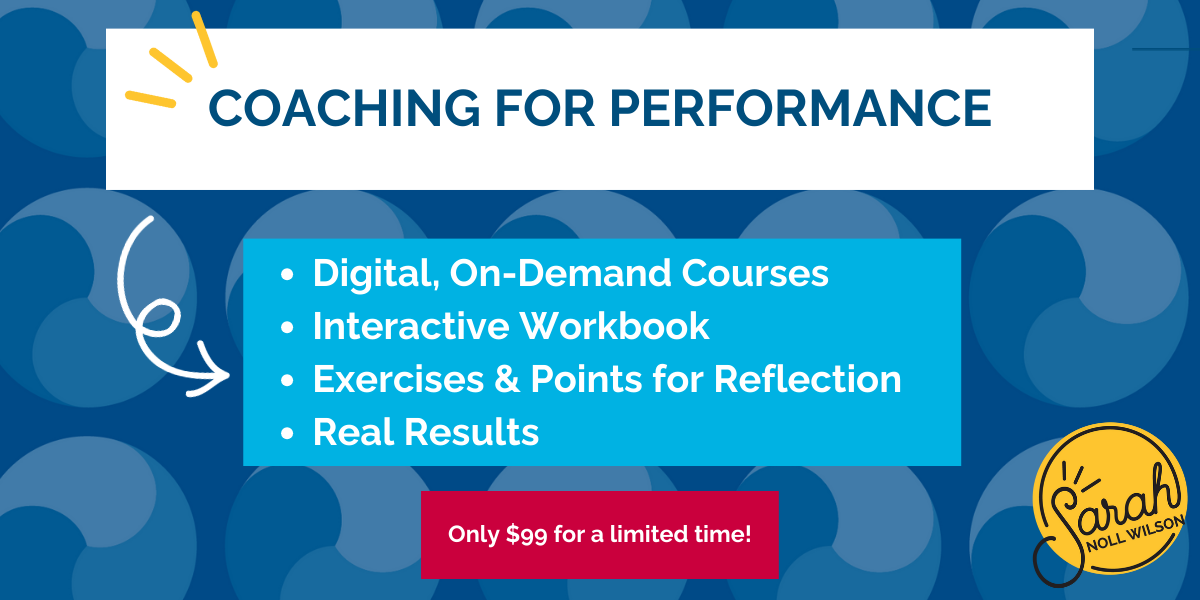
[…] couldn’t be done remotely absolutely can. It will be a hard sell to force people to give up what they’ve gained over this last year. And any leader who truly values and cares about their team members must understand […]